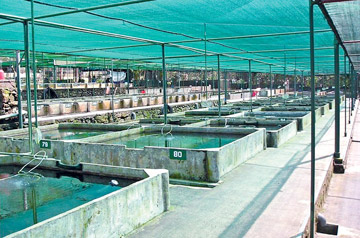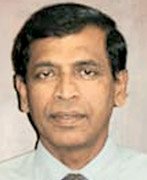NAQDA to promote domestic level aquaculture exports
By Naalir Jamaldeen
The National Aquaculture Development Authority (NAQDA) plans to
promote shrimp, sea cucumber and ornamental fish farming in domestic
level targeting export market, NAQDA Chairman Jayantha Chandrasoma said
in an interview with the Sunday Observer.

Rambodagalla Ornamental Fish farm |
 |
|
Fish harvest at Udawalawe reservoir |
 |
|
Fisheries Minister Rajitha Senaratne releasing shrimps |
|

NAQDA Chairman
Jayantha Chandrasoma |
Farming of these pieces will help improve the economic standard of
rural community, Chandrasoma said.
Chandrasoma said that NAQDA did not fail to address the protein
shortage problem remain in the estates. Compared to the people in other
areas, estate workers consume very low protein per day. NAQDA has
introduced aqua culture in the estate areas. Workers will get the ponds
constructed in suitable places in the estate where they work. NAQDA will
provide technical and financial assistance under the "Divi Neguma"
program, Chandrasoma said. He expressed confidence that problems of
estate workers can be minimised by a considerable level.
Chandrasoma said that this program has been implemented in estates
with the support of the management of respective estates under the "Divi
Neguma" program.
People who reside close to freshwater bodies can set up their own
ponds in suitable places and NAQDA will provide all assistance under the
Divi Neguma program. Chandrasoma said that compared to other regions
protein consumption is very low in the estate areas. This system is
becoming popular among the estate community. There are 130 such ponds in
an estate in Nuwara-Eliya. Construction of 60 such ponds in an estate in
Nawalapitiya have already been completed. The main objective to
implement this program is to eliminate the malnutrition among the estate
workers. Those who breed fish in ponds will be able to earn access
income while receiving protein free of charge. NAQDA provides technical
assistance to this program. Financial assistance is provided by NAQDA
through the Economic Development Ministry.
Chandrasoma said that NAQDA conducts a pilot project for fattening of
lobsters in Valaippadu, Jaffna with the assistance of Vietnam.
Moves are under way to produce sea-bass in Trincomalee. This is a
large scale project and will be implemented by a private sector
institution in the Trincomalee sea. All arrangements have been made to
initiate this project within one month.
NAQDA also plans to breed mud crabs in suitable locations. There is a
good demand for Sri Lanka mud crabs in foreign countries. The
restaurants in Singapore have a separate menu of Sri Lankan mud crab.
Breeding mud crabs is one of the main areas the NAQDA plans to draw
attention in future. They also plan to breed Rainbow trout fish variety
in cold water. During the colonial era British colonialists introduced
this pieces in 1940 in the areas in the central hill country.
NAQDA has also paid considerable attention towards breeding eel fish,
Chandrasoma said.
Following the success of the pilot project of cultivating oysters and
muscles NAQDA plans to introduce the cultivation of these pieces in
future, since there is a need to protect this variety from poaching,
Chandrasoma said.
Shrimp farming is being expanded and popularised in the Eastern
coastal belt. A large scale shrimp farm functions close to Vakarai with
the assistance from NAQDA. People in the Batticaloa district have
already started shrimp farming in suitable locations with the assistance
from the technical experts of NAQDA.
He said that NAQDA has started training and awareness programs on
good management practices and sustainable shrimp farming for shrimp
farmers in the Batticaloa district. The Demonstration level shrimp farm
is situated in the Air Force camp, Batticaloa which was developed built
by NAQDA. demonstration shrimp farms managed by the Air Force Camp
Batticaloa.
Chandrasoma said that NAQDA has deployed its officers across the
country. They provide technical assistance, guidelines from time to
shrimp farmers.
NAQDA implemented several programs to rehabilitate the shrimp farming
industry in the North Western province which was affected by White Spot
disease, he said.
Chandrasoma said that NAQDA operates a laboratory at Battuluoya to
provide services in diagnosing diseases and maintain the healthy
condition of shrimp farming. It has been planned to develop cluster
based shrimp farming in the Batticaloa district and is becoming popular
gradually. Shrimp hatchery established in Batticaloa by NAQDA is
operated under public-private partnership.
Plans are afoot to popularise seaweed cultivation in the North with
the assistance from the Vietnam Government. Already seaweed planting has
commenced in Valaippadu Jaffna as a pilot project. Two leading companies
have commenced farming sea weeds as a pilot project and in the process
of expanding, he said.
Now they have completed the pilot project. Main project is to be
commenced soon with the participation of community or people. Seaweeds,
sea cucumber, ornamental fish are to be produced targeting the foreign
market, he said.
NAQDA provides all assistance including technical assistance to
improve ornamental fishery industry. Two ornamental fish breeding
stations are functional in Rambodagalla and Ginigatthena. A tissue
culture laboratory for Ornamental Aquatic Plant propagation is located
in Rambodagalla. Ornamental fish farming will turn into a lucrative
income earning mode for rural community. Even women can do ornamental
fish farming alone while looking after their children. Rural people can
immensely benefit from this program. This system is being expended
targeting the rural community, Chandrasoma said.
There are two freshwater prawn bursaries in Kahandamodara and
Pambala. Stocking of freshwater prawn in the reservoirs have gone up
during the concluded couple of years. Stocking of freshwater prawn in
reservoirs was 8.06 million in 2009 and increased to 15.54 million in
2012.
The income of fishermen from prawn have also gone up, according to
Chandrasoma. NAQDA implemented pilot projects to introduce and expand
non-traditional aqua farming. Already several community groups and
entrepreneurs have commenced farming of sea cucumber in the Northern
province, he said.
He said that seasonal fishing also takes importance. During rainy
season from November-December people will store rainy water in small
tanks and will stock fish in those tanks after 6 months they will start
harvesting fish from those tanks.
The main focus of implementing these programs are to utilise the
inland water bodies optimally to increase freshwater fish production for
fish production. Providing self-employment is another intention of
strengthening fresh water fishery industry.
The rural economy will also improve. The consumption of fish will
also increase in the villages, Chandrasoma said.
There are different types of of water bodies in Sri Lanka such as
freshwater, brackish water and salt water. Brackish water means the
mixture of salt water and freshwater, he said.
He said that Sri Lanka is blessed with water resources. There are
over 10,000 man made reservoirs and 103 rivers flowing across the
country. These lakes are scattered throughout the dry zones across the
country. There are fish breeding centres operated by the NAQDA
Udawalawe, Dambulla, Inginiyagala and Nuwara-Eliya. We breed fish and
stock in these reservoirs in order to increase the production and to
improve the industry.
In addition to the Head Office in Pelawatta, Battaramulla the
National Aquaculture Development Authority (NAQDA) has 10 aquaculture
centres and 22 Regional Aquaculture Extension offices across the
country.
The National Aquaculture Training Centre of NAQDA functions in
Kalawewa and institute consists of 443 staff. |

